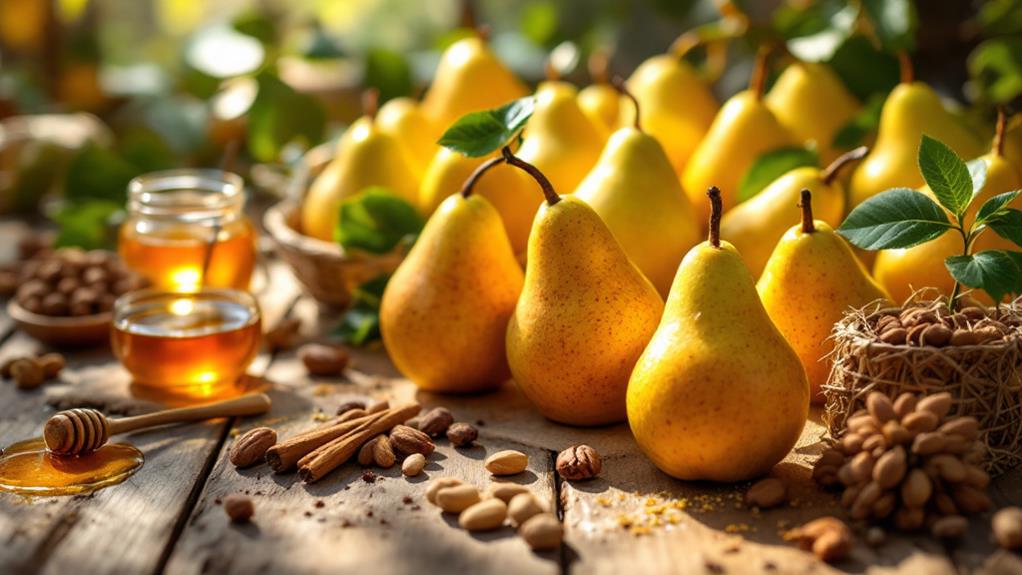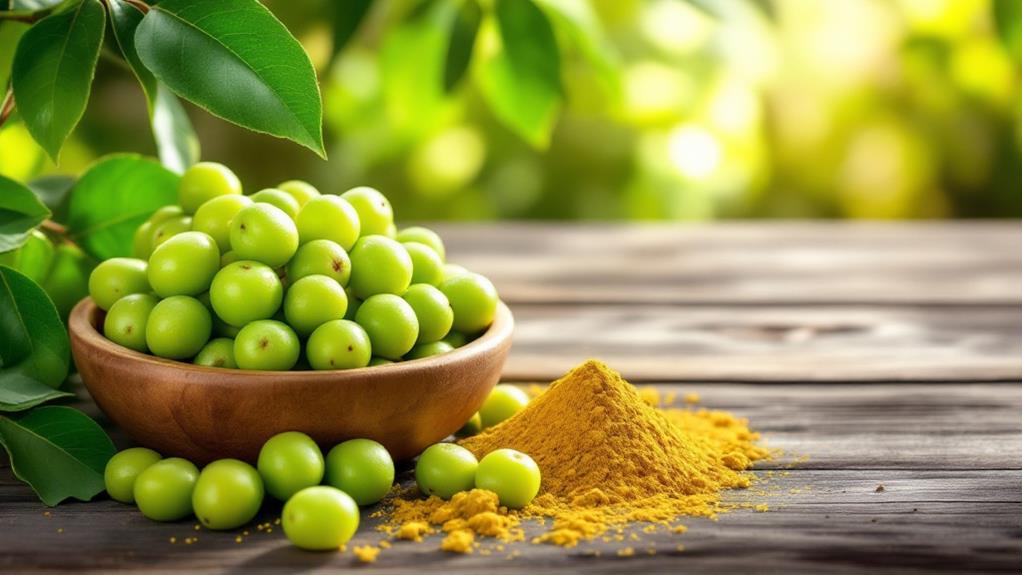Why You Should Be Drinking Roselle Tea: Health Benefits and Uses
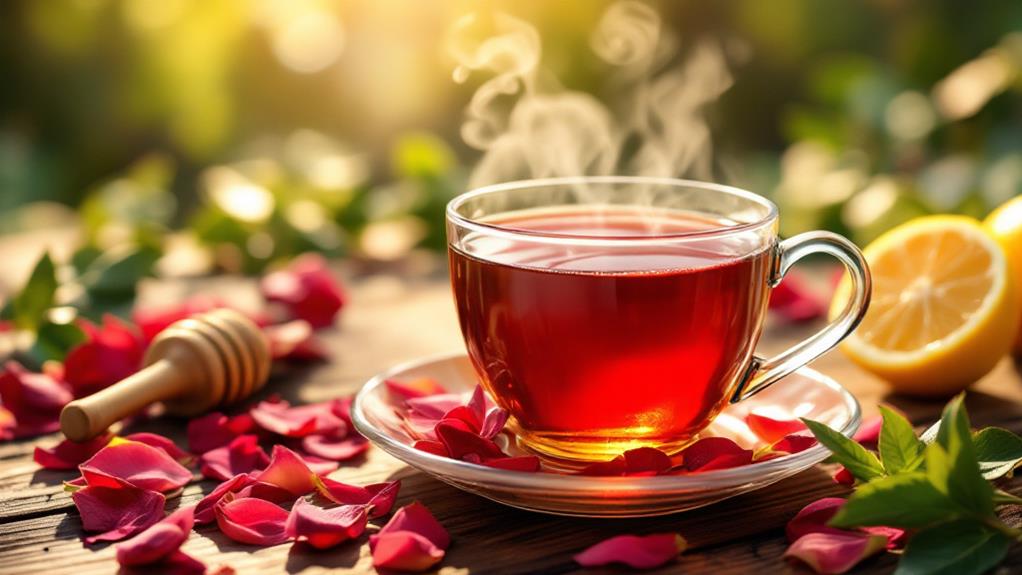
You'll love the health benefits of roselle tea. It's rich in vitamin C to enhance your immune system and packed with calcium and iron for bone and blood health. The antioxidants combat free radicals, and its dietary fiber aids digestion. Roselle tea can help lower blood pressure, supporting heart health, and reduce inflammation, improving your general wellness. Its antibacterial properties also contribute to a healthier lifestyle. You can enjoy it in different forms, from teas and jams to delightful supplements in salads. This versatile tea holds cultural significance and is readily available, offering more insights with every sip.
Nutritional Richness
When you sip on roselle tea, you're not just enjoying an invigorating drink; you're also getting a dose of important nutrients. This lively hibiscus tea is packed with vitamin C, a powerful nutrient that enhances your immune function and aids in collagen production, keeping your skin supple and joints healthy. The high vitamin C content also means roselle tea can help ward off common colds by strengthening your immune system.
Calcium is another significant nutrient found in roselle tea, with 215 mg per 100g. It's fundamental for maintaining strong bones and ensuring proper nerve function. Alongside calcium, the iron content in this tea (1.48 mg per 100g) plays a key role in oxygen transport, further enhancing your body's immunity.
Roselle tea is rich in antioxidants like anthocyanins and protocatechuic acid. These antioxidants are effective at combating free radicals, which can cause cellular damage. By reducing oxidative stress, they support comprehensive metabolic health. Don't forget the dietary fiber in roselle tea, which aids digestion and promotes a healthy metabolism. Drinking this hibiscus tea is a delicious way to nourish your body with important nutrients.
Medicinal Applications
Beyond its nutritional richness, roselle tea serves a host of medicinal purposes that extend its benefits to your health. One significant application is its potential to manage high blood pressure. While you'll find out more about this in the next section, it's remarkable that regular consumption of roselle tea has been associated with lowering both systolic and diastolic readings. The tea's antioxidant properties play a vital role in reducing oxidative stress, which may lower the risk of chronic diseases linked to free radical damage.
Roselle tea also enhances your immune function, thanks to its high vitamin C content. This vitamin is fundamental for collagen production, which improves skin health and aids in wound healing. If you're dealing with respiratory issues, sipping on roselle tea might offer some relief, as it's traditionally been used to alleviate symptoms associated with these concerns.
Moreover, the tea exhibits antibacterial potential, demonstrating effectiveness against harmful bacteria like E. coli. Although not directly related to cholesterol levels, the comprehensive health benefits, including immune support and reduced oxidative stress, contribute to a healthier lifestyle. Accept these medicinal applications and consider adding roselle tea to your daily routine.
Blood Pressure Benefits

Roselle tea's blood pressure benefits are impressive, making it a natural choice for those seeking to manage hypertension. If you're looking to lower both systolic and diastolic blood pressure, incorporating roselle tea into your routine could be a game-changer. Clinical trials demonstrate that regular consumption can reduce systolic pressure by up to 10 mm Hg, offering health benefits comparable to some antihypertensive medications. One study even reported a remarkable drop from 180/120 mmHg to 150/100 mmHg after just a single serving of roselle tea.
Long-term use of this herbal tea has shown consistent results in lowering blood pressure levels. Over a 48-day period, participants experienced significant reductions in hypertension, indicating that roselle tea could be a reliable option for ongoing management. However, it is crucial to exercise caution if you're already on blood pressure medications like hydrochlorothiazide, as roselle may amplify their effects. You should be diligent in monitoring blood pressure levels to avoid potential complications.
Antioxidant Power
Packed with antioxidants, roselle tea offers a powerful defense against oxidative stress. The tea, derived from the hibiscus plant, is rich in anthocyanins and protocatechuic acid. These antioxidants neutralize free radicals, reducing oxidative stress and protecting your cells from damage. Studies on hibiscus extracts, including roselle, have demonstrated an increase in antioxidant levels, effectively combating cell damage in animal models.
The high vitamin C content in roselle tea not only improves its antioxidant capabilities but also enhances your immune health. Vitamin C is crucial for maintaining skin integrity and providing extra support against oxidative damage. By drinking roselle tea regularly, you may lower your risk of chronic diseases like cancer and heart disease, thanks to its potent antioxidant effects.
Research, including studies on patients with Marfan syndrome, has shown that hibiscus extract considerably reduces oxidative stress markers. This underscores the potential health benefits of incorporating roselle tea into your diet. By choosing roselle tea, you're not just enjoying a delicious beverage; you're also making a choice that supports your comprehensive health and well-being. Start sipping this antioxidant powerhouse and adopt its protective benefits today.
Culinary Applications
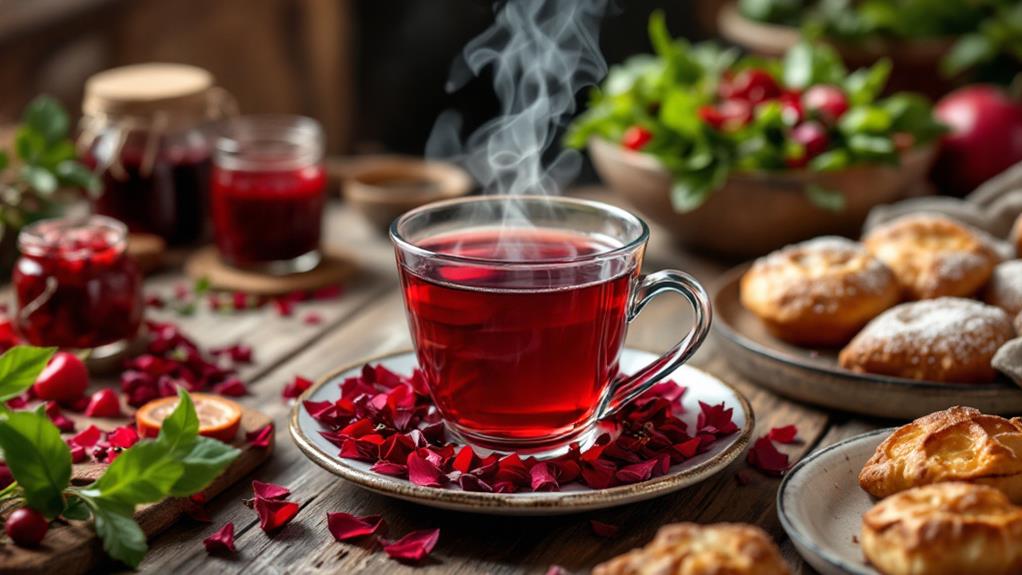
How can you incorporate roselle into your culinary adventures? Start by brewing roselle tea from the dried calyces of the Hibiscus sabdariffa plant. Its tart flavor, reminiscent of cranberries, makes it a revitalizing beverage you can enjoy hot or iced. Beyond tea, investigate the edible versatility of roselle. Use the dried flowers to make jams or add them to smoothies, and you'll uncover a new dimension of flavor and nutrition in your recipes.
Roselle is also a natural food coloring agent, offering a lively red hue to dishes and beverages without artificial additives. Toss roselle leaves into salads, soups, or stir-fries to improve both flavor and nutritional value. These leaves are not only edible but also add a delightful tang to your culinary creations.
In traditional Asian and African cuisines, roselle juice is a popular choice, often consumed for its health benefits. Mix it with other fruits to craft delicious, nutritious drinks. Regardless of your aim to elevate your dishes' appeal or enjoy the health benefits of this hibiscus variety, roselle is a multifaceted enhancement to your culinary repertoire.
Market Availability
In many local markets, especially in regions like Kota Kinabalu, fresh and dried roselle flowers are readily available, making it easy for you to enjoy their numerous benefits. The market availability of roselle means you can easily incorporate this versatile ingredient into your daily routine. Here's why it's accessible and beneficial:
- Local Agriculture Support: UINAH Roselle Paradise crafts beverages using natural roselle sourced from Sabah farmers, promoting sustainable local agriculture.
- Home Cultivation: If you love gardening, you'll be pleased to know that both fresh and dried roselle can be cultivated at home. This allows you to grow your own health ingredients right in your backyard.
- Culinary Applications: Roselle isn't just for tea! Its dried flowers are perfect for making jams and even serve as a natural food coloring, showing off its versatility.
- Widespread Accessibility: You can find roselle products in health food stores and online, making it easy for consumers everywhere to tap into its health benefits.
With roselle's market availability, you're just a step away from adding this health-packed ingredient to your diet, regardless of whether through tea, cooking, or home gardening.
Cardiovascular Support
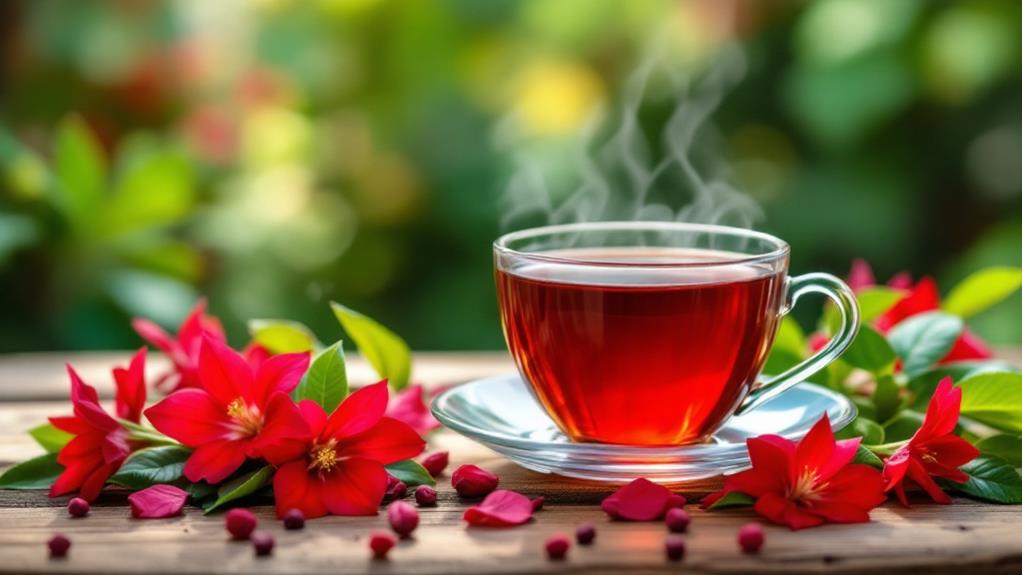
Roselle tea offers impressive cardiovascular support, making it a worthy improvement to your daily routine. With its ability to lower both systolic and diastolic blood pressure, it provides a natural alternative to antihypertensive medications. Imagine experiencing a 10-point reduction in blood pressure levels just by enjoying this tea—79% of regular tea drinkers do! These health benefits make roselle tea an excellent choice for supporting a healthy heart.
Packed with antioxidants like anthocyanins, roselle tea helps combat oxidative stress, a major contributor to cardiovascular disease. By reducing oxidative stress and inflammation, it improves general heart function. These antioxidants work tirelessly to keep your cardiovascular system in top shape, potentially reducing the risks associated with heart disease.
Moreover, roselle tea promotes healthier cholesterol levels, further improving cardiovascular well-being. By incorporating this tea into your diet, you're taking proactive steps to support your heart health. The natural compounds in roselle tea offer a holistic approach to maintaining a healthy cardiovascular system, making it an invaluable supplement to your lifestyle. Enjoy the robust flavor and the peace of mind that comes with knowing you're supporting your heart with every sip.
Cultural Significance
You'll find that roselle tea isn't just a drink; it's a lively thread woven through the cultural tapestry of many regions worldwide. Its cultural significance as a traditional beverage is profound, celebrated for its rejuvenating taste and health benefits. In Latin America, it's known as "jamaica," while in the Middle East, it's "karkadeh." These names echo its integral role in local ceremonies and community bonding, as people gather to enjoy its lively flavor.
In many African countries, roselle tea symbolizes hospitality and unity. It's often served during celebrations, fostering a sense of togetherness:
- Africa: Used in folk medicine and ceremonies, it's a symbol of hospitality.
- Thailand: Infused in herbal drinks and desserts, promoting wellness.
- Middle East: Known as "karkadeh," integral in cultural rituals.
- Latin America: Enjoyed as "jamaica," highlighting its culinary traditions.
Preparation styles differ, from sweetened versions to those improved with lime or spices. In Thailand, roselle is a staple in herbal drinks and desserts, reflecting its deep roots in culinary traditions and wellness practices. Beyond its delightful taste, it's cherished in folk medicine, believed to help alleviate multiple ailments, underscoring its cultural importance in health and wellness.
Future Research Directions

As you investigate the cultural tapestry woven with roselle tea, it's clear that its significance extends beyond tradition and taste. Future research is vital in revealing the full potential of Roselle (Hibiscus sabdariffa) for therapeutic use across multiple health conditions. To harness its benefits, studies should determine ideal dosages and forms, especially for managing cardiovascular health and regulating blood pressure. These investigations will be critical in understanding its long-term impact on chronic diseases.
Clinical trials are fundamental to examine how Roselle interacts with conventional medications, ensuring safe consumption for those on prescribed treatments. Researchers must investigate its potential in cancer prevention and treatment, focusing on the bioactive compounds within Roselle and their mechanisms of action. By doing so, they can uncover insights into its protective qualities against cancer.
Moreover, evaluating Roselle's effects on metabolic health markers, including insulin sensitivity and lipid profiles, will improve our understanding of its role in weight management and diabetes control. By addressing these areas, future research will illuminate Roselle's capacity to enhance health and its therapeutic promise for a range of health conditions, enriching its already impressive profile.



